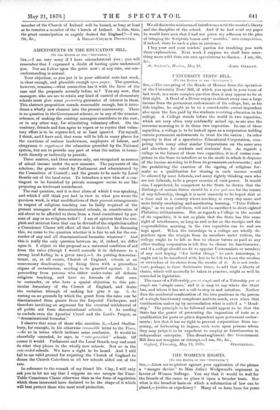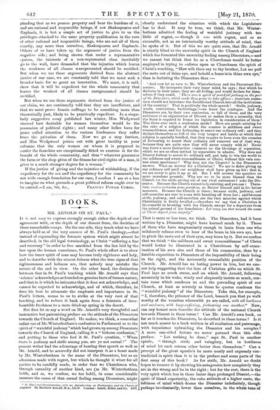THE WOMEN'S RIGHTS.
[To ma EDITOR OF THE "SPECTATOR.'] SIHi—Allow me to protest against your application of the phrase a "meagre device" to Miss Julia's Wedgwood's argument in favour of Woman Suffrage. You say that it would be well for the friends of the cause to place it upon a broader basis. But what is the broadest basis on which a reformation of law can be placed,—justice or expediency? Many of us have been for years
pleading that as we possess property and bear the burdens of it, and are rational and responsible beings, if not Shakespeares and Raphaels, it is but a simple act of justice to give to us the privileges attached to the same property qualification in the case of other rational and responsible beings, who are not all of them exactly, any more than ourselves, Shakespeares and Baphaels. Others of its have taken up the argument of justice from the negative side ; and being shown that under a representative system, the interests of a non-represented class inevitably go to the wall, have demanded that the injustice which leaves the weakness of all classes unrepresented should be rectified. But when we use these arguments derived from the abstract justice of our case, we are constantly told that we must seek a broader basis for so great an innovation. We must, it is said, show that it will be expedient for the whole community that leaves the weakest of all classes unrepresented should be rectified.
But when we use these arguments derived from the justice of our claim, we are continually told that they are insufficient, and that we must prove female suffrage to be something more than theoretically just, likely to be practically expedient. In a singu- larly suggestive essay published last winter, Miss Wedgwood showed how desirable for women themselves would be the possession of political rights ; and many other ladies have for years called attention to the various hindrances they suffer from the privation of them. Now we go a step further, and Miss Wedgwood points out with great lucidity in your columns that the only women on whom it is proposed to confer the franchise are exceptionally fitted to exercise it for the benefit of the whole community, and thus "whatever guarantee the farm or the shop gives of the fitness for civil rights of a man, it gives in a much stronger degree for a woman."
If the justice of giving and the injustice of withholding, if the expediency for the sex and the expediency for the community be not wide enough foundation for our case, I confess I am at a loss to imagine on what grounds a great political reform ought ever to































 Previous page
Previous page